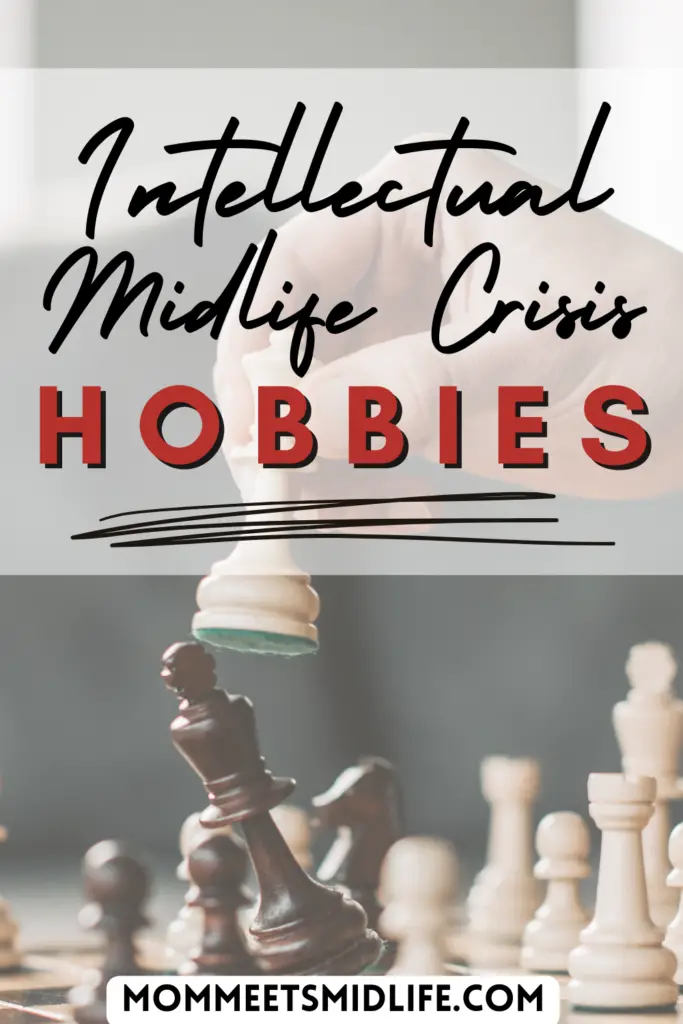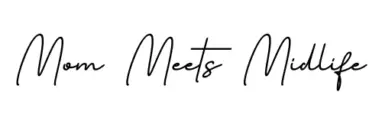Last Updated on April 8, 2024 by Erin
As responsibilities mount and priorities shift, it’s common to search for activities that reignite curiosity. Enter intellectual midlife crisis hobbies. These include pastimes that are fulfilling and thought-provoking.

If you’re new here, welcome! My name is Erin and as you can tell by the name of this blog, I’m a mom entering midlife. I recently experienced an early midlife crisis and ended up making a huge career transition as a result. It’s all worked out for the best and now I’m doing everything I can to navigate the “middle ages” in the best possible way. My hope with this blog is that you find relatable stories and useful information to help you on your path.
After age 35, many of us find ourselves at a major crossroads. Our normal routine starts to feel super stifling and it’s hard to find joy in the things we used to love. This point in our lives, often referred to as a midlife crisis, isn’t merely about flashy cars or impulsive decisions; it can also manifest in a search for fulfillment.
In this final blog post in the midlife crisis hobbies series, we explore different intellectual pastimes and their impact on personal growth.
In the face of existential questioning, intellectual pursuits serve as a beacon of meaning. Instead of turning away from challenging ideas and concepts, try engaging with them! Whether it’s through reading, coding, or learning a new language, individuals in the throes of a midlife crisis can find joy in activities that offer intellectual stimulation and a sense of purpose.
**This post contains affiliate links. This means if you click and buy, I may receive a small commission (at zero cost to you). Please see my full disclosure policy for details.**
The Importance of Reading in Midlife
The term “midlife crisis” often conjures images of drastic lifestyle changes. It’s important to look beyond the stereotype and realize that a midlife crisis extends beyond material acquisitions. For many of us, it’s a profound reevaluation of one’s identity and purpose.
The search for an intellectual midlife crisis hobby represents a conscious effort to reconnect with your interests and rediscover the joy of learning.
For many years, the only books I read were related to my college and graduate school coursework. My brain couldn’t handle any more information outside of what I absolutely needed to know in order to get my degrees. After that, I only read for professional development. In my particular field, 30 continuing education hours are required every two years in order to keep my license. It was really easy for me to get burned out on books!
The problem is, when we don’t keep learning and branching out from “required reading,” our worldview becomes extremely narrow and our ability to use our imaginations suffers greatly. I’m so grateful my midlife crisis resulted in a rediscovery of adult fiction. Last year I ended up reading 87 books on my Amazon Kindle. It was a proud realization for sure, but it also gave me a new pastime that I felt passionate about. And keep in mind that reading isn’t a selfish or frivolous act. It’s a hobby that models good literacy habits to my children and is a wonderful excuse to have quiet, alone time.
If you need any further convincing, here are a couple more reasons to pick up books (outside of required work reading):
Cognitive Stimulation
Let’s just face the facts, shall we? The older we get, the more our cognitive abilities start to decline. It’s a legitimate concern. Reading regularly stimulates the brain, keeping it active and engaged.
When you read you are constantly making inferences, drawing conclusions, and predicting what will happen. Those are critical thinking skills that you need to stay sharp! Keep your mind engaged and keep exposing yourself to new vocabulary and perspectives.
Emotional Resilience
Midlife often brings with it a range of emotional challenges, including stress, anxiety, and existential questioning. I have found that reading can serve as a form of escapism It allows me time to temporarily step away from my worries and immerse myself in different worlds, perspectives, and experiences.
Also, reading about characters who experience emotions similar to one’s own can provide validation and comfort. Seeing characters navigate through difficult situations and emotions helps readers recognize that their own feelings are valid and normalizes the complexities of human emotions. I recently read “There Are No Grown-ups: A Midlife Coming of Age Story” by Pamela Druckerman and it was so refreshing to see some of my thoughts and worries mirrored in her book.
Empathy Development
Reading encourages readers to step into the shoes of others and understand their perspectives and motivations. Perspective-taking is a crucial skill for navigating social interactions and building meaningful relationships. Truthfully, I know A LOT of adults who could benefit from building some empathy. In this current socio-political climate, we could all try a little harder to work on this skill, am I right?
Personal Growth
Midlife is a time of reflection and self-exploration. Reading exposes us to new ideas and ways of thinking, fostering personal growth and development.
Whether through fiction, non-fiction, or self-help books, reading can inspire use to develop new habits or skills. Healthy coping strategies can be the key to having a wonderful and transformative midlife crisis journey, rather than a self-destructive and traumatic one. Sometimes books are the path to discovering those coping strategies.
If you’d like some inspiration for where to start at the library or bookstore, here are some suggestions:
- Transitions: Making Sense of Life’s Changes by William Bridges
- The Power of Now: A Guide to Spiritual Enlightenment by Eckhart Tolle
- The Happiness Curve: Why Life Gets Better After 50 by Jonathan Rauch
- The Gifts of Imperfection: Let Go of Who You Think You’re Supposed to Be and Embrace Who You Are by Brené Brown
- Atomic Habits: An Easy & Proven Way to Build Good Habits & Break Bad Ones by James Clear
Spark Romance
One of the amazing side benefits I’ve come to find from reading adult fiction is that there is romantic inspiration to be found! A passionate fictional romance can reignite feelings and desire within your own relationship. If you’ve been married for over a decade, chances are there have been changes in intimacy. Books can help, I assure you.
Adult fiction novels allow you to explore fantasies and desires in a safe and imaginative way. By reading about characters’ experiences, you may be inspired to explore with your partners. Sharing fantasies and desires can enhance trust and intimacy within a marriage, leading to a deeper connection and greater satisfaction. Just trust me, ok?
If you aren’t sure where to start, go to Goodreads and search suggested romance or fantasy novels. I found many of my reads there and on TikTok using the hashtag #booktok.
Learn a New Language
Learning a new language is a mentally stimulating hobby that opens up opportunities for communication, cultural exploration, and cognitive development.
Whether through classes, self-study, or language exchange programs, mastering a new language challenges the mind and broadens one’s horizons.
One example of an online language learning platform is Skillshare. There are thousands of classes available and you can learn at your own pace on your own time.
Get Philosophical
Delving into philosophical texts and discussions provides an opportunity for critical thinking and reflection. You can also explore fundamental questions about existence, morality, and the nature of reality…if you’re anything like me, this has been on your mind as you get older. Don’t be afraid to ask the hard questions!
Dive into the rich tradition of philosophical literature by reading foundational texts written by renowned philosophers throughout history. Start with accessible introductions or overviews of different philosophical traditions, such as ancient Greek philosophy, existentialism, or ethics. As you become more comfortable with philosophical concepts, you can gradually delve into primary sources and more complex philosophical works.
I started to dip my toes into philosophy after watching The Good Place show, starring Kristen Bell and Ted Danson. It’s a comedy, but definitely raises interesting questions on morality, free will, and the afterlife.
Will your head start to hurt? Maybe. I suggest starting a journal and reflecting on the thoughts you have while pondering the tricky parts of life.
Once you get going, consider taking classes or joining online groups to discuss philosophical topics. Skillshare, again, offers many beginner and intermediate classes if you’re thirsty for more knowledge.

Critical Thinking Puzzles and Games
Activities such as puzzles, Sudoku, chess, or strategic board games require problem-solving skills, logical reasoning, and analytical thinking. These games provide mental stimulation and challenge, while also offering opportunities for social interaction and camaraderie.
Here are some examples of critical thinking puzzles and games suitable for those of us in midlife:
Crossword and Cryptic Puzzles
Crossword puzzles are a classic and accessible form of mental exercise that tests vocabulary, general knowledge, and lateral thinking skills. Working on crossword puzzles regularly can improve vocabulary retention, enhance cognitive flexibility, and provide a satisfying sense of accomplishment.
Cryptic crosswords are a variation of traditional crossword puzzles that involve wordplay, cryptic clues, and hidden meanings. Solving cryptic crosswords requires the ability to decipher complex wordplay. It is a rewarding mental workout for puzzle enthusiasts.
Sudoku
Sudoku is a number-placement puzzle that requires logical reasoning and deduction. It stimulates the brain by engaging the areas responsible for problem-solving and pattern recognition. Sudoku puzzles come in various levels of difficulty, making them suitable for individuals of all skill levels.
Chess
Playing chess promotes critical thinking, spatial awareness, and decision-making skills. I’m grateful my daughter asked me to learn to play so we could play together. I needed something that forces me to slow down and think ahead…something I really struggle with in my daily life.
Logic Puzzles and Brain Teasers
Logic puzzles, such as logic grids, deductive reasoning puzzles, and lateral thinking puzzles, require participants to analyze clues, make inferences, and draw logical conclusions. These puzzles encourage systematic thinking, creative problem-solving, and mental agility.
(I remember doing logic grids in school and I found them so fun and challenging! I haven’t found a great adult grid puzzle book yet, so if anyone has any recommendations let me know!)
Brain teasers are short, challenging puzzles designed to stimulate the brain and test cognitive abilities. They come in various forms, including riddles, math problems, and visual puzzles. Solving brain teasers can improve memory, concentration, and attention to detail.
Strategy Board Games
These are a favorite in our household! Strategy board games, such as Settlers of Catan, Ticket to Ride, and Carcassonne, challenge players to formulate long-term plans, assess risks, and outmaneuver their opponents. These games promote strategic thinking, resource management, and social interaction, making them ideal for midlife individuals seeking mental stimulation and camaraderie.
Escape Rooms
The popularity of these have dwindled in our community but they are still incredibly fun and challenging! Escape room challenges are immersive puzzle-solving experiences that require participants to work together to solve clues, unlock mysteries, and escape from a themed room within a set time limit. These interactive adventures promote teamwork, communication, and lateral thinking skills while providing an exhilarating and memorable experience.
Art Appreciation
Explore different forms of art! This can include visual arts, music, theater, and film. Get out there and be inspired! Learn to appreciate different expressions of art and different cultures.
Visiting museums, attending performances, or learning about art history can deepen one’s understanding of artistic expression and cultural heritage.
Coding and Programming
Learning to code or exploring computer programming languages is a highly intellectual hobby that offers practical skills and creative potential. It challenges individuals to think logically, problem-solve, and create innovative solutions to complex problems in the digital realm.
Maybe this hobby can take you on a whole new career path! Does the thought of a midlife career change scare you? It shouldn’t! The whole reason I created this blog was to document my early midlife crisis and career transition. (Check out those posts while you’re here!)
Debating and Public Speaking
Engaging in debates on current events, ethical dilemmas, or philosophical topics promotes intellectual engagement and fosters respectful discourse.
If you’ve had unique life experiences, consider sharing with others and offer to speak at different events! I’m always so inspired by those who have the courage to speak in front of others or on a podcast. Ooooh- there’s another hobby to consider- a podcast! Brilliant!
Final Thoughts
These are just a few examples of intellectual hobbies that individuals can pursue to stimulate their minds, broaden their knowledge, and enrich their lives.
The key is to find activities that align with one’s interests, passions, and personal goals for cognitive growth and development.
Make sure to check out the other blog posts in this midlife crisis hobbies series:
- Exploring Midlife Crisis Hobbies to Rekindle Joy
- Monetizing Midlife Hobbies: the Pros and Cons
- Embrace the Great Outdoors with a Midlife Crisis Hobby
- Creative Midlife Crisis Hobbies to Get You Out of a Rut
- 11 Exciting Physical Midlife Hobbies (& What They Say About You)
Sincerely,
Erin



